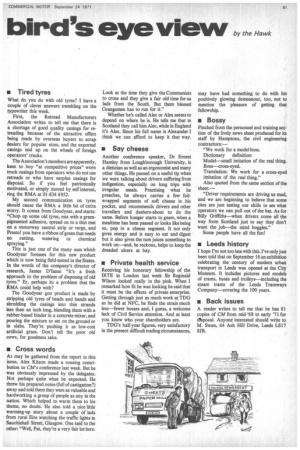bird's eye view bythe Hawk
Page 37

If you've noticed an error in this article please click here to report it so we can fix it.
in Tired tyres
What do you do with old tyres? I have a couple of clever answers trembling on the typewriter this week.
First, the Retread Manufacturers Association writes to tell me that there is a shortage of good quality casings for retreading because of the attractive offers being made by overseas buyers to scrap dealers for popular sizes, and the exported casings end up on the wheels of foreign operators' trucks.
The Association's members are apparently, keen to buy "at competitive prices" worn truck casings from operators who do not use retreads or who have surplus casings for disposal. So if you feel patriotically motivated, or simply moved by self interest, ring the RMA at 01-834 6952.
My second communication on tyres should cause the RMA a little bit of extra worry. It comes from Goodyear, and starts: "Chop up some old tyres, mix with a greenpigmented adhesive, spread on to a thin mat on a motorway central strip or verge, and Presto! you have a ribbon of green that needs no cutting, watering or chemical spraying."
This is just one of the many uses which Goodyear foresees for this new product which is now being field-tested in the States. In the words of the company's director of research, James D'Ianni "It's a fresh approach to the problem of disposing of old tyres." Er, perhaps its a problem that the RMA could help with?
The Goodyear goo product is made by stripping old tyres of beads and bands and shredding the casings into thin strands less than an inch long, blending them with a rubber-based binder in a concrete mixer, and pouring the mixture to set on the ground or in slabs. They're pushing it as low-cost artificial grass. Don't tell the poor old cows, for goodness sake.
• Cross words
As may be gathered from the report in this issue, Alex Kitson made a rousing contribution to CM's conference last week. But he was obviously impressed by the delegates. Not perhaps quite what he expected. He threw his prepared notes (full of castigation?) away and told them they were as valuable and hardworking a group of people as any in the nation. Which helped to warm them to his theme, no doubt. He also told a nice little warming-up story about a couple of lads from rural Eire watching the traffic lights in Sauchiehall Street, Glasgow. One said to the other: "Well, Pat, they're a very fair lot here. Look at the time they give the Communists to cross and they give a fair old time for us lads from the South. But them blessed Orangemen has to run for it."
Whether he's called Alec or Alex seems to depend on where he is. He tells me that in Scotland they call him Alec, while in England it's Alex. Since his full name is Alexander I think we can afford to keep it that way.
• Say cheese
Another conference speaker, Dr Ernest Harnley from Loughborough University, is a dietician as well as an ergonomist and many other things. He passed on a useful tip when we were talking about drivers suffering from indigestion, especially on long trips with irregular meals. Practising what he preaches, he always carries a few foilwrapped segments of soft cheese in his pocket, and recommends drivers and other travellers and dashers-about to do the same. Before hunger starts to gnaw, when a mealtime has been passed or looks like being so, pop in a cheese segment. It not only gives energy and is easy to eat and digest but it also gives the turn juices something to work on—and, he reckons, helps to keep the dreaded ulcers at bay.
• Private health service
Receiving his honorary fellowship of the IRTE in London last week Sir Reginald Wilson looked really in the pink. When I remarked how fit he was looking he said that it must be the effects of private enterprise. Getting through just as much work at TDG as he did at NFC, he finds the strain much less—fewer bosses and, I guess, a welcome lack of Civil Service attention. And at least you know who your shareholders are.
TDG's half-year figures, very satisfactory in the present difficult trading circumstances, may have had something to do with his positively glowing demeanour, too, not to mention the pleasure of getting that fellowship.
• Bossy
Pinched from the personnel and training section of the lively news sheet produced for its staff by Hamptons, the civil engineering contractors:—
"We work for a model boss.
Dictionary definition: Model—small imitation of the real thing. Boss—cross-eyed.
Translation: We work for a cross-eyed imitation of the real thing."
Also quoted from the same section of the sheet:—
"Driver requirements are driving us mad, and we are beginning to believe that some sites are just testing our skills to see what operators we can pull out of the hat. As for Billy Griffiths—when drivers come all the way from Scotland just to say they don't want the job—the mind boggles."
Some people have all the fun!
• Leeds history
I hope I'm not too late with this. I've only just been told that on September 16 an exhibition celebrating the century of modern urban transport in Leeds was opened at the City Museum. It includes pictures and models of trams, buses and trolleys—including the steam trams of the Leeds Tramways Company---covering the 100 years.
• Back issues
A reader writes to tell me that he has 81 copies of CM from mid-'68 to early '71 for dtsposal. Anyone interested should write to M. Swan, 64 Ash Hill Drive, Leeds LS17 8JR.










































































































